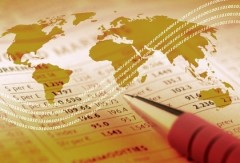Lesson 1 – A Look at Forex
 Forex is the short name for Foreign Exchange market and it is the place where currencies are exchanged between them. It is the world’s largest market when it comes to cash value traded. On this market the players are central banks, large banks, currency speculators, governments, multinational corporations and other financial institutions and markets. There are also retail traders operating on this market, but they represent just a small part. Their participation is indirect, through banks or brokers.
Forex is the short name for Foreign Exchange market and it is the place where currencies are exchanged between them. It is the world’s largest market when it comes to cash value traded. On this market the players are central banks, large banks, currency speculators, governments, multinational corporations and other financial institutions and markets. There are also retail traders operating on this market, but they represent just a small part. Their participation is indirect, through banks or brokers.
Traders in Forex seek to gain profit from the movements of foreign currency. Currency trading or Forex trading is performed in currency pairs. In 2003, on August 26th, for instance, the exchange rate between Euro and US Dollar was 1.0857. This is what is called rate, or Forex rate. For buying 1000 Euros, an investor would have got out of the pocket 1085.7 USD. Same date, but in 2004, the rate between these two currencies was 1.2083. This means an increase of the Euro’s value related to the USD.
This means that if the investor sold the 1000 euros he had bought the previous year, he would get 1208.30 USD. This translates into a profit of 122.60 US Dollars. However, before telling whether it was a good investment or not, this investment needs to be compared with other alternatives. The ROI or return on investment has to be compared to a return on another investment considered free of risk. Such a risk free investment is considered the U.S. Government bonds on long term. The risk here is practically nonexistent, as the U.S. Government won’t go bankrupt and will always be able to pay the debt obligation.
The wisest thing to do when trading currencies is to make the move when the currency you want to buy is expected to increase relative to what you intend to sell. When the currency you bought increased in value, then you should sell it back to obtain profit. An open trade or open position takes place when a trader buys or sells a pair of currencies, but hasn’t yet bought back or sold the equivalent amount, thus the position is not closed.
Estimations state that speculations represent between 70% and 90 % of the Forex market. This means that traders, no matter if they are institutions or persons, do not have an initial plan to deliver the currency after having traded it. They are just waiting to see how the market evolves and act on the spot, depending on how the currency they are interested in moves.
History of money
When trade first appeared, goods were exchanged between them, what is called barter: goods exchanged for other goods.
Introduction of Money
Moneys as mean for exchange date back to the era of the Pharaohs. It is believed that Babylonians were the first ones to use receipts and paper bills. Middle Eastern traded coins from different cultures for the first time.
At the beginning, coins were minted from a preferred metal. However, in the Middle Ages there were political regimes which, due to their stability, introduced a form of I.O.U. Issued by government, on paper. Still, these were introduced by force and not by persuasion, but the system stands at the basis of the modern currencies of our times.
Previously, paper bills were used to transfer third-party funds payments. This way, foreign currency exchange was much easier to trade, so regional economies started to flourish.
The Gold Standard
Gold was a convertible currency until the break of the first World War and it was used by most Central banks. Paper money was always exchangeable for gold. In order to operate this type of exchange, there was no need for Central banks to fullz cover the currency reserves of the government. This was not a usual trade, but when a larger group of interests decided to massively convert back to gold, the phenomenon was called “Run on banks”. More paper money on the market than gold to cover it has as result the inflation and political instability of a state.
To avoid the interference with the nations’ interests and to protect them from possible attacks on currencies, there were introduced foreign exchanged controls.
